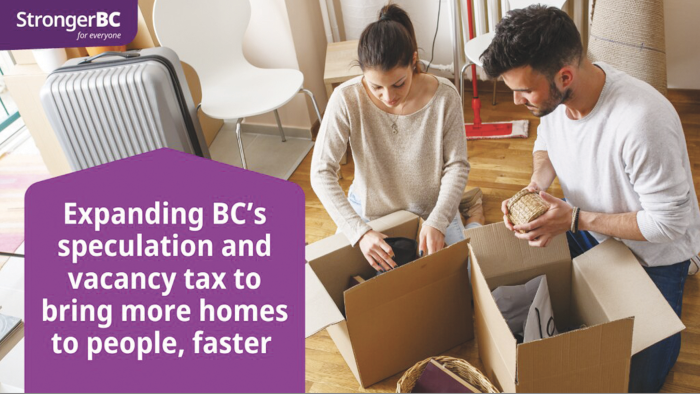The Province is taking action to fight real estate speculation and turn
more empty units into homes for people by expanding the speculation
and vacancy tax to 13 new municipalities.
“There is a housing crisis across the country and it is creating economic
challenges, including people feeling pushed out of their communities and
labour shortages,” said Katrine Conroy, Minister of Finance. “With so
many people struggling to find secure housing, we have to keep taking
action – we can’t afford to pull back. The speculation tax is one of the
ways we can help increase affordable housing options for people and
communities.”
Expanding the speculation tax is part of B.C.’s Homes for People plan that
includes actions to fight speculation, deliver more homes within reach for
people, and speed up delivery of new homes.
“There’s something wrong when people are buying up investment homes
and keeping them empty while others are living in vehicles and can’t find
housing,” said Ravi Kahlon, Minister of Housing. “Homes are meant to be
lived in by people in our communities, not used for speculation. While
some would cancel the speculation tax – giving a handout to speculators
and turning homes back into empty condos – we know that people can’t
afford that. We’re taking action to make more homes available for people
throughout the province.”
An independent review released in 2022 found that the tax had helped
deliver more than 20,000 homes in Metro Vancouver alone. The report
included recommendations that government consider taking a phased
approach to expanding the speculation and vacancy tax to additional
communities to build on the success of the measure and deliver more
homes for people.
The speculation and vacancy tax will be applied to the following municipal
boundaries to help ensure more empty homes are made available for the
people who work and live there:
• Vernon, Coldstream;
• Penticton, Summerland;
• Lake Country, Peachland;
• Courtenay, Comox, Cumberland;
• Parksville, Qualicum Beach;
• Salmon Arm; and
• Kamloops.
Residential property owners in these communities will need to declare for
the first time in January 2025 based on how they used their property in
2024.
This gives owners in the new areas time to decide how to meet
exemption requirements before the tax takes effect. Exemptions include
primary residences, properties with a long-term tenant and life events,
such as separation or divorce.
More than 99% of people living in B.C. are exempt from paying the tax.
(news.gov.bc.ca
